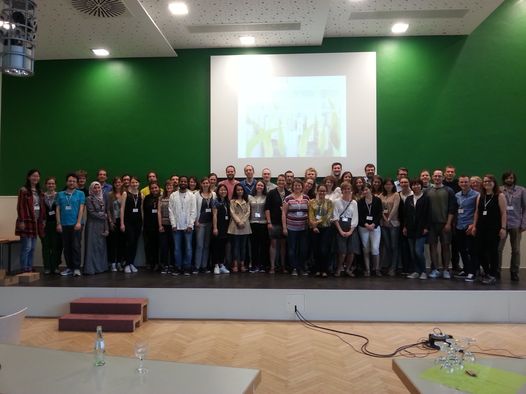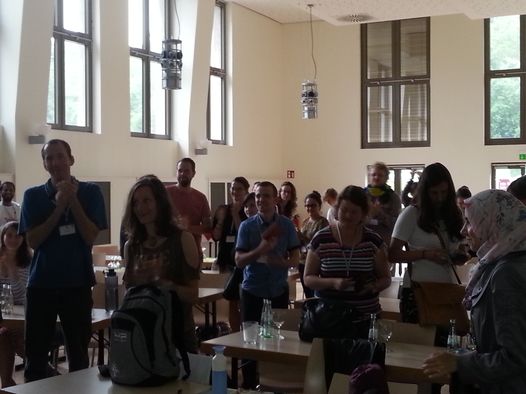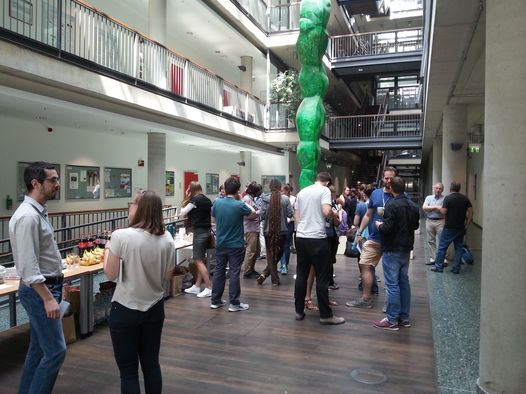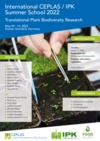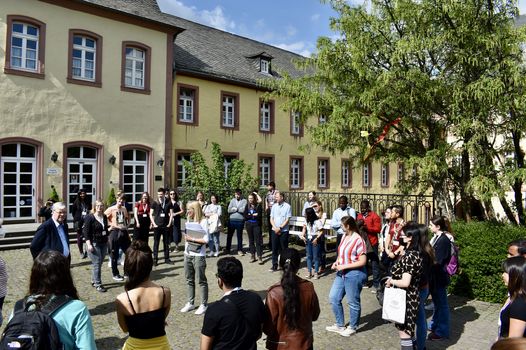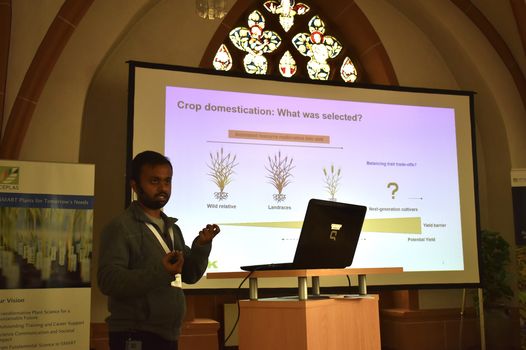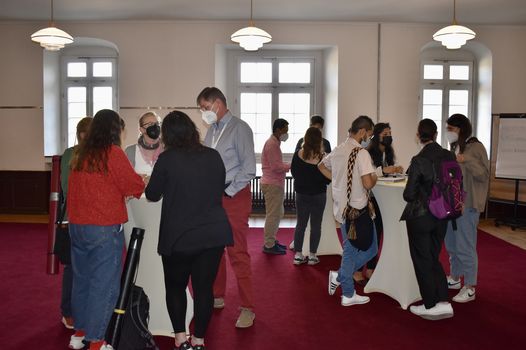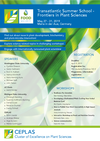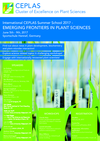International Summer Schools
Every second year in May in the Competence Area Food Security and CEPLAS organize an international summer school on a specific topic in plant sciences. At the summer school, up to 60 PhD students and Postdocs from all over the world come together for one week to learn more about specific topics in plant sciences, participate in workshops and network with other researchers.
Usually CEPLAS and Food Security partner for the events with other research institutions to promote exchange and collaborations. So far, summer schools have been organized with members of Washington State University, UC Davis, Michigan State University and IPK Gatersleben.
53 PhDs from 19 countries meet since Monday at the monastery Kloster Steinfeld in the Eifel.
Participants of the current Summer School can expect a program in the Eifel region at Steinfeld Monastery, whose historical beginnings go back more than 1,000 years, that extends over five days and includes numerous workshops and lectures.
For example, the competence area "Food Security" of the University of Cologne has offered a workshop on global food security with discussions on current challenges to achieving and maintaining food security. Other workshops will focus on "Resilience for Scientists," "Publishing," and "Self-Presentation."
Among the numerous speakers of the Summer School are Andreas Weber, speaker of CEPLAS, but also some working group leaders of the IPK Leibniz Institute. A poster prize and a prize for the best presentation will be awarded. Stan Kopriva, Scientific Director of the Summer School, emphasizes that "we have brought together a very diverse group of PhD students who all have one thing in common, namely a fascination for plant sciences. I am impressed by the quality of the students' contributions so far and their active participation in the discussions. We have all clearly missed this coming together."
Meanwhile, Dr. Dorit Grunewld, organizer of the "Food Security: Thinking Outside the Box" workshop, speaks of an "inspiring workshop" on economic issues related to food security. "This one showed everyone once again how important it is to think outside the box. For us plant biologists, the workshop helped us to better understand the complex situation of global food security and to link it to our own work."
Jens Freitag, co-organizer from the IPK Leibniz Institute, emphasized at the event that "in addition to the joint organization and design, the importance of direct scientific exchange and intensive discussion after the experience of the Corona pandemic was felt to be of particular value by all those present."
The IPK/CEPLAS Summer School is aimed at PhD students and young postdocs. They will learn more about recent developments in translational biodiversity research in plants as well as the exciting research being conducted in CEPLAS and IPK. In addition, participants will have the opportunity to present their results to a broad scientific audience and also further build their professional network by interacting with young and internationally renowned researchers in plant sciences.
The Summer School is the prelude to a series of joint events with which the two partners CEPLAS and IPK intend to expand their already existing contacts into a lasting cooperation.
Transatlantic Summer School - Frontiers in Plant Sciences
May 27 - 31, 2019, Maria in der Aue, Wermelskirchen, Germany
The international CEPLAS Summer School, co-organized with researchers from WSU, UC Davis and MSU offered an opportunity to learn about current topics, to delve into state-of-the-art plant science and to network with fellow early career scientists and well known experts in the field.
The programme was complemented by workshops on science related subjects such as science communication, or resilience for scientists. Additionally, the competence area “Food Security” of the University of Cologne offered a special workshop on global food security with enriching discussions on current challenges to achieve and sustain food security.
The first CEPLAS Summer School took place from 5th to 9th June 2017 at the Sportschule Hennef. The Summer School gave 47 participants from 10 countries, mainly PhD students, the opportunity to learn about the newest developments in plants science from CEPLAS investigators and three international guests (Ben Blackman, Ian Graham and Rob Last). The aim of the CEPLAS Summer School was to provide a platform for PhD students to learn about CEPLAS topics and promote an information exchange between peers and PIs.
For many participants the programme started at the University of Cologne with a "Peer2Peer" satellite event organised by CEPLAS postdocs led by Antonella Succurro. The programme targeted three pillars of scientific life in an informal way: careers, networking and conflict management. To break the ice the event started with a “speed dating” set-up. The event ended with an introduction to the concept of „peer coaching“. All participants of the satellite event went by bus to the Sportschule Hennef where the main programme of the Summer School commenced with a short introduction to CEPLAS and its mission by the main organiser, Stan Kopriva.
The honour of the first talk was given to one of our foreign guests, Ian Graham from CNAP in York, UK, who gave a fascinating review of the approaches to understand the synthesis as well as to increase the production of plant metabolites for human health.The scientific programme for the four following days consisted of lectures by CEPLAS PIs, invited external speakers and selected talks from PhD students. Andreas Weber presented an overview of approaches to improve plant photosynthetic productivity and George Coupland offered insights into his programme to understand mechanisms underlying the onset of plant reproduction. Erich Kemen talked about the assembly of leaf microbiome and Ben Blackman from the University of California in Berkeley explained how plants adapt to their local environments. Their talks were accompanied by presentations of PhD students Franziska Kuhnert, Silke Weckopp, Andrea Tkacz, Camila Ribeiro and Sorin Tanasa. On the next day Alga Zuccarro showed her progress in understanding the mechanisms of interaction of plants with fungal endophytes and Maria Albani explained the different effects of vernalisation on annual and perennial plants. Maria von Korff showed in her presentation on inflorescence development in barley how to work directly with crops. Later Lutz Schmitt introduced the family of plant ABC transporters and Stan Kopriva explained how to use quantitative genetics to dissect nutritional traits. PhD students Colleen Friel, Kevin Lehner, Varanya Kittipol and Suraj Sharma presented their projects in a short talk. On Thursday Andreas Meyer (University of Bonn) talked about redox homeostasis in plants and how it affects root growth and Peter Dörmann, also from the University of Bonn, shared his interest in lipids. Matias Zubriggen introduced some synthetic biology concepts and Rob Last from Michigan State University focused on a group of interesting metabolites from tomato trichomes.
On two of the five days of the Summer School the programme finished with well attended poster sessions. After dinner most students made use of the sports facilities at the Sportschule Hennef. This was followed by informal get-togethers at the sports bar which gave participants the opportunity to get to know each other and to discuss scientific and other matters with their peers and PIs.
During the second half of the week students attended workshops which focused on communicating, networking & career building (led by Mary Williams), research misconduct (Leonid Schneider) or science journalism (Claudia Ruby). This day finished with a barbecue, sports activities and a practical session of networking.Friday, the last day of the summer school, started with the dissection of light signaling presented by Ute Höcker and continued with an interactive session on the topic „Food Security“ led by Andreas Weber. This session ended in a lively discussion on the role of scientists and education of the public.
A prize was awarded to Katie Rogers and Ji Yun Kim for presenting the best posters at the Summer School.
After the end of the main Summer School programme a number of participants, who had some spare time before their journey home, took a short city tour of Cologne, organised by CEPLAS students.
